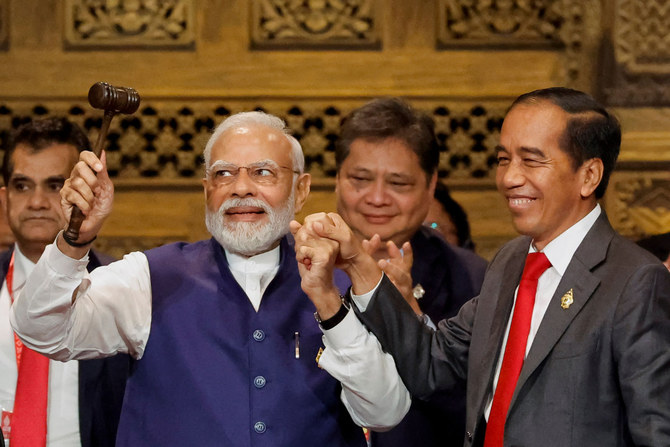DENPASAR, Indonesia/NEW DELHI, India: Indian Prime Minister Narendra Modi promised on Wednesday to make the G20 a catalyst for global change, as India took over the G20 presidency from Indonesia.
Indonesian President Joko Widodo handed over the rotating G20 presidency to Modi at the closing session of a leader’s meeting that marked the culmination of his chairmanship over the past year.
G20 leaders adopted a joint declaration despite divisions in the bloc over the war in Europe, with most members “strongly” condemning the Russian aggression against Ukraine.
Modi acknowledged the many challenges facing the world while pledging a presidency that would be “inclusive, ambitious, decisive and action-oriented.”
He said: “India is taking charge of the G-20 at a time when the world is simultaneously grappling with geopolitical tensions, economic slowdown, rising food and energy prices, and the long-term ill effects of the pandemic.
“Over the next one year, we will strive to ensure that the G20 acts as a global prime mover to envision new ideas and accelerate collective action.”

Modi said the G20 must convey a strong message “in favor of peace and harmony” and announced the theme of “One Earth, One Family, One Future” for its chairmanship.
India’s G20 presidency will be an opportunity for New Delhi to “reflect on its own journey as a global leader,” Harsh V. Pant, head of strategic studies at the New Delhi-based Observer Research Foundation, told Arab News.
At a time of severe geopolitical turmoil, India may seek the role of a “bridge between the developed and developing worlds,” as well as “a bridge between Russia and the West,” he said.
Though India had initially been reluctant to condemn the invasion of Ukraine, Modi told Russian President Vladimir Putin in September that “today’s era is not of war."
The challenge ahead for India is the fragmentation and polarization in global politics, Pant said.
“An economic platform like G20 is being torn apart because of geopolitical differences,” he said.
Indonesia, as G20’s previous chair, had to navigate the complexities brought about by the war in Ukraine just three months into its chairing the group, as the conflict triggered a global food and energy crisis.
There were concerns that the Bali summit would not produce a leaders’ declaration, as G20 members were divided over the causes of the crises.
“I think India, which wants to shape the global developmental agenda…will have to navigate some of these currents of geopolitical contestation of major powers,” Pant said.





























